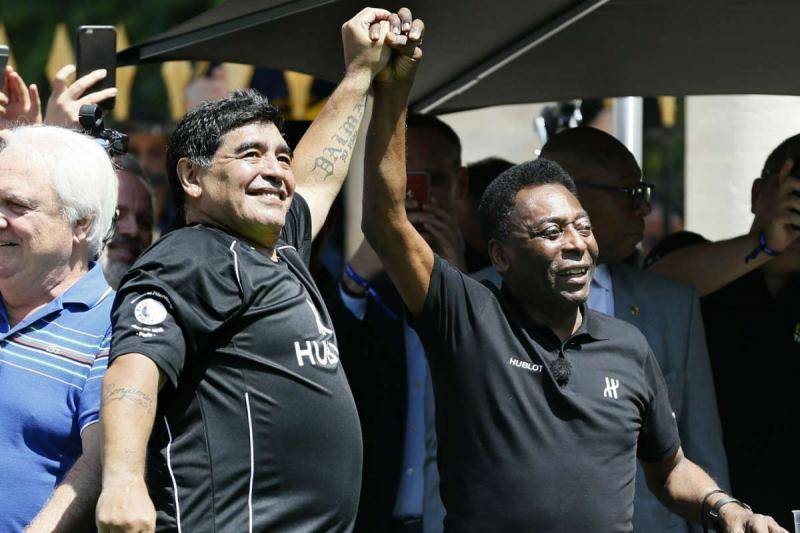
As massive as Maradona’s on-field legacy is – which includes titles in three different countries, as well as captaining Argentina to victory in the 1986 World Cup – his charisma and resonance off the pitch were possibly even greater.
Maradona regardless fully embraced the notoriety as playing the scallion role of underdog pretty much suited him, beginning with his leaving Barcelona for Napoli in 1984 in a world-record transfer that left many deriding his move. Understandably Naples was an impoverished city located on the wrong side of the country’s north-south divide, and Napoli was a team that had never been close to clinching a league title. The main propaganda mainly propagated the art of feeding the masses an impossible dream at great expense. A losing proposition altogether. Until the great Maradona came along and rewrote the entire script.
Diego Armando Maradona made what was the impossible tangibly possible delivering two league titles to the city, in the process gleefully slam-dunking the wealthier blue bloods from affluent north. Did he do this quietly? Of course not, it just wasn’t in his flamboyant style and character to lie low and do things on the quiet. He steamrolled it while strategically immersing himself into the city and the club’s fan base, raising a ruckus against the authorities behind the scene when he wanted things to go his way.
The eternal teenager, uncurtailed and totally without restraints, Maradona happily spoke his mind, wavering between valiantly – when it came to taking his stance against war and poverty – and petulantly, coyly playing the victim when things weren’t in concurrence with his views. With this predisposition and firing straight from the hips, he attacked everyone over the years, from Pele to FIFA, without a care for propriety or consequences.
Maradona was also not beyond playing to a gallery when he needed to. Yet that said, he also always eventually made up with virtually all of his adversaries, one way or another. It wasn’t their forgiveness he sought – it was just that he somehow made it impossible for most to stay angry at him, as can be attested to by the fact that virtually every player he has ever played with or against remembers him fondly. This itself tells its own story.
He chose to be different. When it suited him, he trained but only when he wanted to. Often he didn’t even train at all, not that this affected his playing negatively in any way on the pitch. Apparently with Maradona, it all boils down to one’s proximity with him – the closer one was to him, the more impossible it is to resent him. One just fed off his greatness and happily let things slide.
1978 World Cup winner Mario Kempes fondly shares his memories of teammate Diego Maradona.
“In 1998, an hour before the World Cup final, I was with a group of 20 or 30 members of the media huddled around Pele in the bowels of the Stade de France. Pele, the only other GOAT candidate at the time – Messi and Ronaldo were children back then – was holding court about the upcoming clash between Brazil and France. Suddenly, there was a commotion down the concourse. Within seconds, the media disappeared, racing away, cameras and notebooks in hand.
“I, a young reporter at the time, was left with Pele and his media handlers.
‘What’s going on?’ Pele asked.
‘I think … I think Maradona has just arrived …’ replied one of his aides.
Pele shook his head and smiled wryly.”
Maradona was both the infallible hero on the football pitches we dream of emulating and also the fallible enfant terrible we decry. Yet he made us see the dark side lurking inside all of us. Only that he allowed that dark side to break loose in his personal life beyond the football fields. Like a true life Don Quixote, he rode his strengths and yet when he came to jousting with the imaginary windmills that were his dastardly dragons, he failed to tame his weaknesses. Perceived with an open unbiased mind, it’s his human foibles that made him ultimately human and real, without any hypocrisy in him. This actually balanced out his otherworldly football genius, making him as fallible as anybody else could be, celebrity or otherwise.
To recapitulate, among his four World Cup appearances, he led Argentina to the title in 1986, with the scoring of both momentous goals in their 2-1 quarterfinals victory against England. The first was the notorious “Hand of God” goal, the most disputed in the annals of football; the second was the breathtaking finisher after a celestial 66-yard dribble past five supposedly stalwart England players who were quickly left stone-struck even long after the ball found the net at the English end.
Former England manager Sir Bobby Robson had this to say after what had transpired:
“The first goal was dubious; the second was a bloody miracle!”
“You have to say that is magnificent. There is no doubt about that goal. That was just pure football genius,” said BBC commentator Barry Davies.
Maradona said simply it was “much more than winning a match, it was about knocking out the English!”
Refreshingly in his book, Maradona later said of the earlier goal:
“Now I can say what I couldn’t at that moment, what I defined at that time as ‘The Hand of God’. What a hand of God, it was the hand of Diego!”
He later admitted that the goal came thanks to “a little with the head of Maradona and a little with the hand of God”.
That’s both the rapscalion and artful dodger that’s Maradona. The hero and the rascal all in one. You just can’t separate one from the other.

